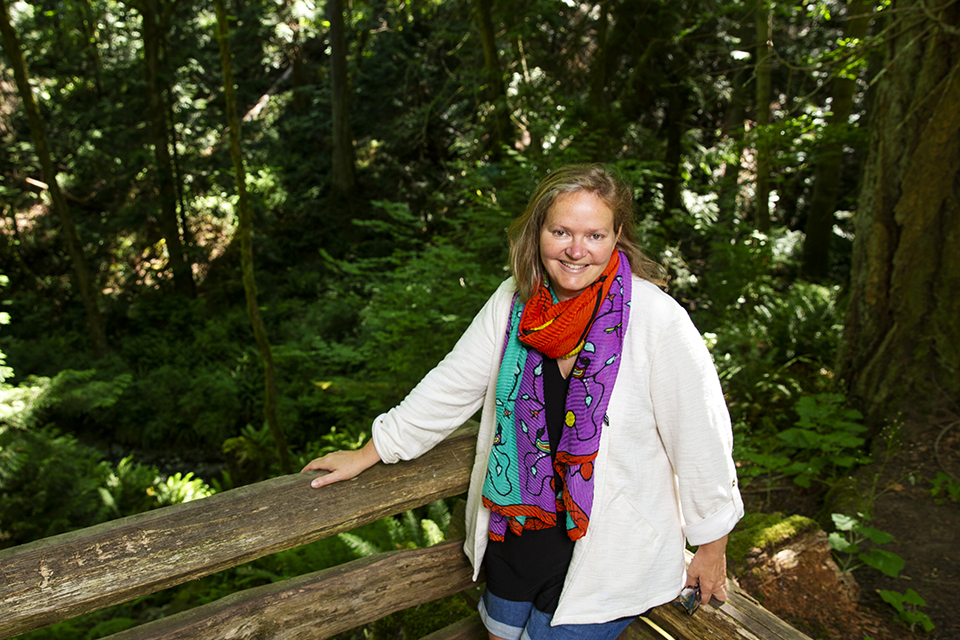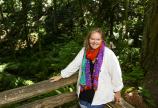Expert Q&A with activist-scholar in human and planetary health

Heather Castleden has joined UVic’s School of Public Administration as professor and the inaugural Impact Chair in Transformative Governance for Planetary Health. The activist-scholar and human geographer, whose appointment began July 1, brings her research expertise in the areas of environment, health, social justice and decolonization.
She comes to UVic from Queen’s University where she was a Canada Research Chair and associate professor in the Department of Geography and Planning, Graduate Chair in the Department of Gender Studies, and Research Director of the Health, Environment, and Communities Lab, which she will continue at UVic. She is also a principal investigator on the Ontario-based Indigenous Mentorship network program: Mno Nimkodadding Geegi: We Are All Connected.
Castleden talks about her goals, motivations and working with the tensions of listening, acting and making change.
What research areas will you focus on in your role as Impact Chair in Transformational Governance and Planetary Health?
One is climate change and individual to nation-state responses to climate change. I'm looking at it with a decolonizing lens—that is, Indigenous sovereignty and rights, as well as Indigenous and non-Indigenous responsibilities to our local and environment—what I refer to as planetary health. And hand in hand with that, I will be applying an equity and diversity lens to explore how people are affected by climate change differently based on socioeconomic status, on their skin colour, or their age or gender. The third, is the socio-political dimensions of renewable energy and how to make a just and equitable transition. This has been a major focus of mine over the past five years through a research program funded by Canadian Institutes of Health Research called A SHARED Future.
What are the connections between human health and planetary health?
The harm we do to our planet is the harm we do to ourselves. It’s all connected. Indigenous peoples have known this, through their own science, through their own observations. But we no longer live at local scales. Through settler colonization and racial capitalism, we live in a global economy and what happens in one part of the world will affect what's happening to others in another part of the world. And that includes human health. We see that through transboundary pollutants and contaminants. We see that through global warming and climate change and how melting ice coverage, wildfires, floods...all of these things are having a dramatic impact on human health.
Why is it important to take a collaborative rather than competitive approach to this work?
An equitable energy transition needs to include collaborations across sectors, conducting cross-jurisdictional and international research. At the same time, we need to examine our existing strategies together in real-time so we can respond quickly when things aren’t working out equitably. To make radical transformations to our global dependence on fossil fuels, we also need to move towards more socially and environmentally just governance structures that draw from multiple knowledge-systems, in particular, from Indigenous peoples.
You refer to yourself as an activist-scholar. How do you see your role in that respect?
The kind of community-based research that I do is slower than conventional bench science, because you are taking the time to listen and learn. Before you start to ask questions, before you start to do any data collection, you need to really spend time listening to people, listening to the land—drinking tea. When there's a problem, if you actually spend time together, in ceremony or in a community and on the land, you can come up with solutions that will be responsive to everyone's needs. There are also times when activist scholars need to be angry or assertive. They need to be at the forefront of issues and be comfortable using their academic privilege to speak to power-holders and decision-makers, including the media.
Is there a tension between taking the time to listen and the need to act?
Yes, I feel a sense of urgency to try different things and try them now. And that's where the local Indigenous knowledge keepers can bring their expertise to the table. Despite all of the genocidal impacts of settler colonialism here in Canada, all the abuse and injustice they have faced, there are still many who are willing to share local knowledge and there are growing numbers of non-Indigenous peoples who are welcoming such knowledge, embracing it and lifting it up. Technology isn't the only solution. While some people are willing to make change, others need to be brought along. I think that's the role of universities, to provide that research evidence to show how it can happen, and UVic is well positioned to do that.
Why are you excited to do this work at UVic?
In Canada, UVic is seen as a leader with respect to Indigenous scholarship and the number of Indigenous scholars and students here. Being able to be in these spaces with these key thinkers is phenomenal and I’m really excited about that! And I’ve already seen such an enthusiasm and support for different ways of knowing—not just Western epistemology. And that seems to be embraced right across campus from students to senior administration. A lot of the work I’ve been doing has been in solidarity with Indigenous peoples around decolonizing the academy. When you work with people who are on-side with a just transition, and you’re not always fighting against the current, that’s tremendously appealing and the necessary work can happen faster.
What do you see as your role in decolonization as a non-Indigenous scholar?
It's about turning the lens on ourselves as non-Indigenous peoples and educating ourselves about who holds the power, how decisions are being made, and then to work at the structural problems that maintain the status quo in favour of white supremacy. We need to step back and—when necessary—step aside, and work towards creating the positive change that we talk about. We need to foster mutually respectful Indigenous-settler relations in all our institutions through fundamental reform of institutional policies and practices.
Where will you start?
I need to spend time listening. I'm new to this territory. I have a lot to learn here, and I'm interested in people reaching out to me and sharing their stories with me. And I'll share my stories if invited to do so. I will be conducting research, leading engagement activities across and beyond campus, teaching and supervising graduate students, and developing a research lab on transformative governance for planetary health. So, I will be reaching out to folks at the university community about sitting in an advisory circle to guide me in its development.
A media kit containing a high-resolution photo of Castleden is available on Dropbox.
Photos
Media contacts
Heather Castleden (School of Public Administration) at castleden@uvic.ca
Suzanne Ahearne (University Communications + Marketing) at 250-721-6139 or sahearne@uvic.ca

